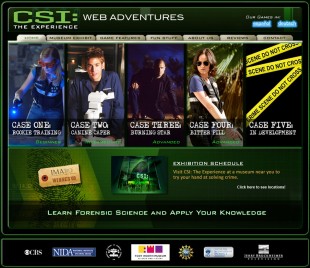First of two expansions for award-winning online science game
CSI fans and would-be forensic investigators the world over can try their hand at solving an arson murder mystery online, thanks to a new federally funded expansion of Rice University’s hit educational game “CSI: Web Adventures.”

In "CSI: Web Adventures," players assume the role of a forensic investigator and try to solve a murder mystery.
Rice’s Center for Technology in Teaching and Learning (CTTL) this week unveiled the first of two planned expansions for its popular “CSI: Web Adventures,” a game series based on the hit CBS television show. Players assume the role of a forensic investigator and try to solve murders. In the process of gathering evidence and conducting lab tests, players learn valuable lessons about scientific methods and practice.
The original “CSI: Web Adventures” games were launched in 2007 with funding from the National Science Foundation. They were designed to appeal to teens, but CTTL found the games also appealed to many adult fans of the TV show.
“About a half-million people viewed ‘CSI: Web Adventures’ last year, which makes it our most popular game series,” said Yvonne Klisch, a CTTL researcher and grant co-investigator who oversees the games’ development. “About half of the visitors to the site are return visitors, and hundreds have written to request that we add more cases.”
“CSI: Web Adventures” initially featured three “cases”: a training mission and two more advance murder mysteries. The circumstances of each case dictate the forensic techniques and the science topics that are covered.
From both Web-traffic patterns and posted game reviews, CTTL knows that many of the players are middle- and high-school students. Given the popularity of the games with this age group and the games’ use in science classes around the world, the National Institute on Drug Abuse (NIDA) funded the development of two new cases to address the growing problem of prescription drug abuse among teens. The first, titled “Bitter Pill,” debuted this week.
“Our goal is to combine both forensics and neuroscience into storylines that will educate a broad audience about the dangers of prescription drug abuse,” said Leslie Miller, CTTL executive director and principal investigator on the NIDA grant. “Having the support of CBS with access to resources from the television series contributes to the game series’ popularity around the world. CSI fans are also a large part of our audience.”
In “Bitter Pill,” players are initially called to investigate a house fire in Las Vegas. One person is dead at the scene and a second is injured. By examining the evidence and interviewing witnesses, players can eventually reconstruct what happened at the crime scene. “Bitter Pill” is the first case in “CSI: Web Adventures” to teach arson forensic methods.
Klisch said “Bitter Pill” and case No. 5, a still-untitled mystery that’s scheduled to debut this fall, are the most advanced and complex whodunits yet devised for the game series. In fact, the two new cases are so complex that most players will not finish them in one class period, so Klisch said the game developers also revised the games’ “save” feature to make it easier for players to solve the mysteries over several sessions.
“CSI: Web Adventures” has been viewed by 1.4 million users in 198 countries. It is available in English, Spanish and German.
CTTL’s other free online science games include “MedMyst,” where players investigate infectious disease outbreaks; “Reconstructors,” in which students solve mysteries about chemical substances that have both harmful and helpful effects; “N-squad,” which focuses on the science behind alcohol abuse; and “Cool Science Careers,” a role-playing game series highlighting a variety of science careers. All of CTTL’s games are available at http://webadventures.rice.edu. A sixth game series, “Virtual Clinical Trials,” which simulates how clinical trials work, is under development.


Leave a Reply